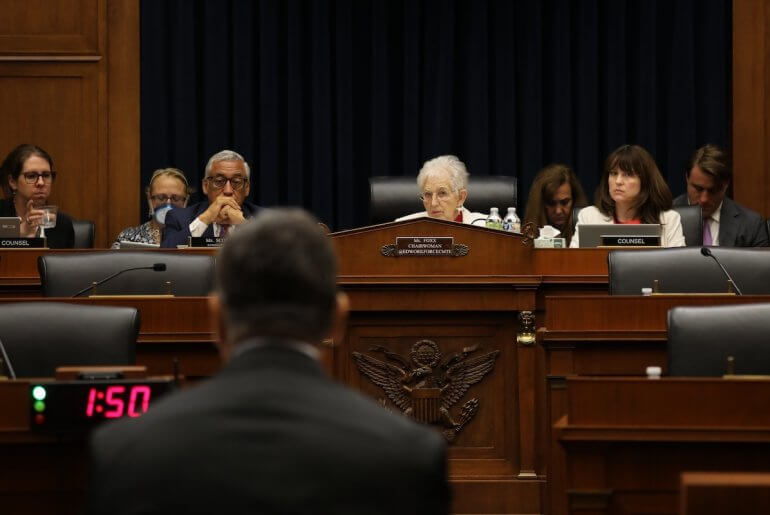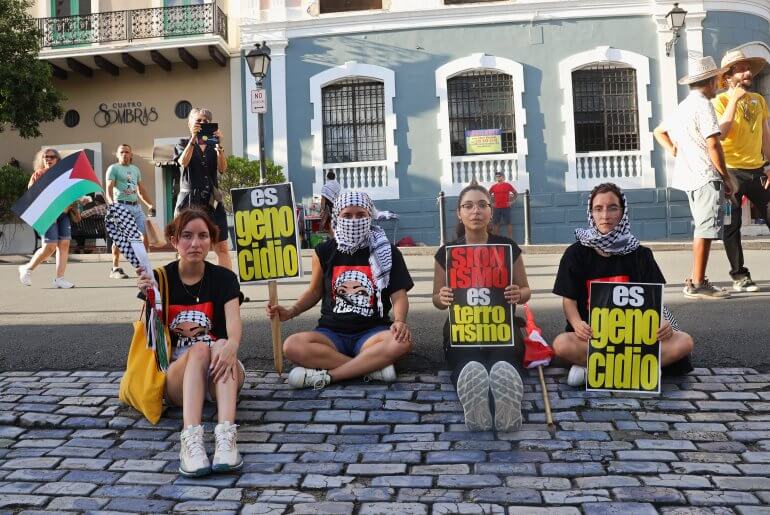For this month, we’re excited to announce our February pick is Zaina Arafat’s debut novel, “You Exist Too Much.” The book is narrated through vignettes by an unnamed bisexual Palestinian-American protagonist who is struggling with an eating disorder, a shifting relationship with her mother, and busy with unattainable infatuations. The cuts between childhood and adulthood take the reader from Jordan, to Egypt, to Washington DC, to Cambridge, to New York, to Bethlehem, in a hunt for acceptance from those closest to her, and from herself. While the lead character is a less traditional representation of a Muslim woman of color, her impulse to seek what is beyond her scope is universal. We think this is an outstanding debut novel and are elated to share it with you.
We’re delighted to announce at the end of the month we are going to host a live event with the author! Stay tuned and we’ll update you with information on how to reserve tickets (the event is free), and where to submit questions for Zaina.
When purchasing your copy of “You Exist Too Much,” use the promo code BookClub at checkout for a 10% discount.
Update, March 8, 2021: In conversation with Zaina Arafat
YOU EXIST TOO MUCH
by Zaina Arafat
263 pp. Catapult. $25
Copyright © 2020 by Zaina Arafat, from You Exist Too Much. Reprinted by permission of Catapult.
In Bethlehem when I was twelve, men in airy white gowns sat at a three-legged table outside the Church of the Nativity. They ran prayer beads through their fingers and sipped mint tea in gold-rimmed cups shaped like hourglasses, steam floating off the surface and up into the bright blue sky. I walked past them with my mother and my uncle as we wandered through the holy city. One of the men called out, “Haram!”
Forbidden. For the especially devout among us, it’s haram to eat meat unless the animal has been killed in a specific way. Haram to drink alcohol. Haram for a pubescent girl to expose her legs in a biblical city. It occurred to me then that I wasn’t a flat-chested kid anymore, that curves had begun to appear along the length of me. I was no longer indistinguishable from a boy child. Somehow, I had stopped noticing my body long enough for it to change.
“What should we do?” I asked my mother. I felt a pulsing lump take shape in my throat as I noticed her teeth gritting, her jaw extended and temples shimmering. My great-grandparents’ house was where we were staying and where all of my clothes were, thirty-six miles and three checkpoints away. I felt myself go cold as I closed my eyes and prepared to receive her reaction—I knew better than to try and preempt it with an apology. All I could do was strategically try to calm myself, to remember that the anticipation was heavier than the thing itself.
I should’ve had more sense than to dress in such a way when we were visiting the birthplace of a prophet, albeit not our own. My mother had, and still has, a native’s knowledge. She knows the rules instinctively, in that part of the world, and I only ever learn them by accident.
But then, why did she let me leave the house that way? Was this all part of some plan to teach me a lesson? To my uncle, I was ajnabi, a foreigner, which essentially gave me permission to dress however I pleased. But not to my mother. I’d grown used to maneuvering within the lanes of her behaviors, looking to them as guidance, her innate instincts precluding me from finding my own.
“Baseeta,” said my uncle. It’s okay.
My mother looked me up and down. We approached the main door of the church and the men hissed again. My uncle ran the tips of his fingers across his mustache, then looked to my mother and me. “Come,” he said. “I have an idea.”
We followed him into a gift shop just off Manger Square. He dropped a few shekels on the counter, then asked the shopkeeper if we could use his bathroom. My mother grabbed a Kit Kat off the shelf and tore it open, breaking apart two sticks without a second thought. My uncle dropped three more shekels on the counter. The man pointed toward the back. My uncle thanked him and led the way.
His master plan was that he would trade me his trousers for my Roxy surfer shorts. He went into the bathroom first, and I could hear sounds of fumbling, his belt buckle jangling as it hit the floor. He opened the door slightly and handed his pants to my mother, so she could administer the swap. She then stood in front of me while I took off my shorts. “Yalla,” she said, her most frequently used word. Hurry.
I pulled on the pair of pants. They sagged on me. I had to tighten the belt buckle all the way up to the last hole and then roll the waist so that they wouldn’t fall off, leaving me even more exposed than I had been before.
I stepped out of the bathroom and looked at my uncle. I examined my new curves against his ridiculous pasty legs, gangly and covered in sporadic patches of hair, my shorts tight against his thighs like boxer briefs. It occurred to me in that moment to question why, as a man, his bare legs were somehow less troubling than mine. It was a double standard, a shame I had simply accepted until then. In acquiring my gender, I had become offensive.
But as I stood in front of him, an unexpected pride began to swell inside me. I liked the way his trousers made me feel. Seen. Like I could get attention from boys, from girls.
“Inti walad, willa binit?”—Are you a boy or a girl?

A security guard at the InterContinental hotel in Amman had once asked my cousin Nour this question when deciding whether to lead her into the curtain-shrouded “women’s check” for an intimate pat-down before she could enter the lobby.
“Binit!” Nour had responded. “Girl!” She’d been insulted by the question, the uncertainty it revealed. But not me. Not that day. Wearing my uncle’s baggy trousers, I enjoyed occupying blurred lines. Ambiguity was an unsettling yet exhilarating space.
As we walked back toward the Church of the Nativity I looked at my mother and smiled, desperate for her to smile back. But she withheld. She offered only a freshly disconcerting look, scrunching up her forehead so that lines appeared, her cheekbones protruding, her mouth forming a terrifying expression of indifference. At the time, I couldn’t quite place the source of it. Had she noticed my contentment? Did it scare her?
Only now, years later, do I think I understand. It was in that moment that she first realized: I wasn’t like her. The trousers were a demarcation line, one that separated me from my mother and her lineage.
I wonder sometimes if that day was the start of something. Whether it’s when I began this habit of constant seeking, of endlessly striving to earn my way back, a pattern that would send me on a misguided and self-destructive quest for love. I communicated something to my mother as I stood there smiling in a pair of men’s pants, a message I didn’t know I was sending her. She has always known first what I have yet to discover, has always seen it before I could.
Look at me, I wanted to say to her then. Please don’t look away.
Chapter 1
I woke up alone one morning when I was twenty-six. Anna had left for the day. Her side was already made, to the extent that half a bed can be: the comforter pulled up over her pillow, sheets crumpled underneath. She’d opened the curtains before leaving, knowing I liked to be woken by sunlight. She was always finding solutions for things I preferred to simply complain about. Though it was finally bright out, I felt the usual pang of dread. “Your death hour,” my best friend, Renata, liked to call it. “Seems normal.”
I looked at the cat clock that Anna had brought with her when she moved in, the calico tail twitching: it was nine fifteen. Early, given that I’d spun a double set the night before and taken a lot of tequila shots to stay fueled. Anna had an afternoon class on Tuesdays and Thursdays, meaning she’d still be at the café beneath our building. I then reached to the surface of the night- stand for my grad school acceptance letter. I’d gotten into an MFA program for writing in the Midwest. It was the deadline to send in my decision.
I lay there for a few moments willing myself to get up before finally tossing off the sheets and swinging my legs off the bed in one swift motion. I pressed my feet to the cold hardwood and walked to the kitchen, which was an extension of the same room, only the flooring different, linoleum instead of wood. I touched my hand to the silver coffeepot—still relatively warm. Anna must’ve just left; I had only just missed her. Lately I’d been trying to make a point of waking up earlier. Renata had suggested it a few weeks ago: “Maybe your girlfriend would like to see you in daylight, from time to time? Wouldn’t that help things?”
I dropped a piece of bread into the toaster, then sat down at the kitchen table and opened my laptop. It purred to life, the cursor unfreezing. I typed g in the address field and the rest of the url filled in. The screen turned to white as an hourglass twirled. When my inbox appeared, my eyes descended to the chain I wanted, mine and the professor’s. I had written to her the day before; we were arranging to see each other one last time before I left New York. Her name wasn’t illuminated—no response yet.
I clicked refresh, as though an email would appear in that split second. I refreshed my inbox a few more times before emptying my spam. I was about to close my laptop when a text from my mother flashed across the top of the screen:
On train to NYC. Staying two nights.
Stress washed over me, the familiar lump forming in my throat. I ran my fingers through my hair until a few strands came away into the palm of my hand. I heard the spring of the toaster, but no longer felt hungry. My mother lived in D.C. and regularly came to the city without warning. “You don’t own New York,” she’d say whenever I requested advance notice or logistical details, which I’d since learned not to do. Any attempt to get a firm date from her, some degree of commitment, made her uncomfortable and irritable, as did any reaction to her arrival that fell short of sheer delight. “And no one’s asking you to even see me,” she’d say. True, but the onslaught of her presence was impossible to resist, the promise of days spent shopping, the alluring sound of r’s rolling off her tongue, the smell of her perfume lingering long after she would leave.
I began to type a series of questions—Where will you be staying? For how long?—then deleted them. I took a deep breath and responded, Can’t wait to see you.
Downstairs, the café beneath our building was full, the window seat taken. I glanced around and spotted Anna hunched over a tiny round table near the back. She wore a red plaid shirt buttoned all the way to the top and a black Patagonia fleece vest unzipped, her knuckles pressed against her cheek and her bangs combed back, making her look a little like Luke Perry or the lead singer of a boy band. Handsome pretty, I would call her, and she liked that, each time beaming with pride. She looked up and saw me, her eyes brightening as I ordered a coffee from the barista. I smiled back, but as I walked toward her carefully, trying not to spill, I felt guilt, which almost instantly morphed into shame. “Hey,” I said, taking the chair across from her, my attention caught by a community bulletin board with tabulated flyers, the middle teeth all ripped off. “I see Brokeback’s at our spot again.”
A woman wearing cowhide chaps and cowboy boots sat with a mug steaming in front of her. The sight of her always made me uncomfortable, and my discomfort usually disappointed Anna.
“Yep,” she said, forcing a laugh. Then she leaned forward and kissed me. The experience was new enough that I still felt a wave of exhilaration at the ability to kiss a woman in public, as though what we were doing was illicit, two high schoolers smoking pot on the football field. I kissed back and pulled her closer for a second kiss when the first had ended, overcompensating. Anna reached across and pressed her thumb to the side of my mouth. “You’ve got a little . . .”




